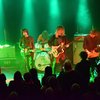Growing up in Slough when I did, to enjoy even a morsel of music that wasn’t identified as UKG or sounded like Joe Pasquali had fallen into a blender, I had to travel. To get my fix of blues, mod beat, and rock and roll, I had to take the 20 minute or so trip to Paddington and Tube it to the likes of Soho, Camden, or Kentish Town.
Gone were the days when the Rolling Stones would blast out hit after hit at Windsor’s Ricky Tick Club, or when legendary late-night acid house raves at The Slough Centre sent the nation into a rhythmic tribal frenzy – when I was able to go to the pub it was all terrible chart music.
Slough has always been very tightly knit with London’s jungle and UK garage scene, and just to be clear, I’m not slagging off the genres or the efforts of my fellow townsfolk in any way, it’s just not my bag. As a mop-headed lad who enjoyed the likes of The Who, The Doors, The Stones, The Stooges, The Jeff Beck Group, Junior Wells, and Oasis (among many others), I was pretty much outnumbered - there just wasn’t a market for that stuff where I lived.
When I was around 18-years-old, I started studying music tech at Reading College and met a few blokes who enjoyed the same jingle-jangles as I did, and they liked to mess around on guitars. One night, following the consumption of around six pints of Guinness at a Reading Wetherspoon's, a college mate of mine suggested going to a place called the After Dark.
“Is it a strip club?” I asked in a sloppy haste.
“No,” he said, “it’s the best dive in town.” Intrigued, I followed like a loyal hound.
Before long I was led down a dark alley clad with festering chips and the lingering smell of piss, before reaching two colossal men in trench coats who asked us for ID.
We entered to the sound of ‘Spread Your Love’ by BRMC and began to bob our heads and move our feet instantly. Girls and boys wearing quirky clobber and sporting indie hairdos swayed and bounced to tune after tune; the bass rumbled through the floor, up my legs, and into my torso, and the budget disco lighting made the dim no frills club room look like a backdrop from the set of Doctor Who. Finally, I had found my place.
After some while, I felt the need to stop for a breather, so my mates and I stumbled into the back room which sported the look and feel of a 1960s cafe, except it sold draught beer, spirits, and cans of Red Stripe, all for a very competitive price. I distinctly remember listening to ‘Green Onions’ while slurping down my £1.20 can of Red Stripe, wondering why I hadn’t discovered the After Dark sooner.
Well, that was the first of many visits. Inside the club, I got to know people and everyone became one big like-minded family, except there was enough diversity to keep things interesting; if you weren’t into your indie, your alternative, your electro, or your rock, it didn’t matter – you could still come in and join in the fun, hassle free.
One of the greatest things about going to the After Dark was hearing rare tracks from lesser known artists from the 60s and 70s – works of art that would seamlessly blend with the kind of rock and roll anthems that would work everyone into a euphoric frenzy.
I didn’t witness a single fight at the After Dark during my time there. Once a bloke got so excited by hearing ‘Up The Bracket’ that he accidentally nudged someone off the stage who was so intoxicated, they urinated themselves as they hit the floor. The piss-trousered victim shouted a few choice expletives at the nudger, but someone picked him up, we all had a laugh, then a drink, then more of a dance, and carried on with the rest of the night.
Now, the After Dark was, and for today’s youth still is, a rare and vital gem. Not only does it care about preserving the integrity of the music, but it also provides young and frustrated youngsters with an exciting, price-accessible, safe haven in which to let loose and be themselves; it’s just one example of many places like this tucked away up and down the country.
The problem with these places is that they’re seen as derelict holes by big-wig investors. Like many independent clubs who care about their punters, the After Dark is in the throes of being torn down in the name of greed. A property developer is trying to get rid of the club to build ten luxury flats in the area and take it away from the locals who need it most.
The After Dark is under threat; it may become extinct, and the sad thing is, it’s difficult to fight against those holding the fat wallets. This kind of soulless greed is killing grassroots music across the UK, and if the trend continues, there will be no venues left to host alternative DJs trying to connect with their audience, or upcoming artists looking for a platform to showcase their talents. No, soon enough we will all be subjected to listening to novelty techno-pop while sipping frozen cocktails in a fun pub made of MDF and broken dreams. But, surely we don’t want that?
There are plenty of blinding establishments that are still going strong, and we need to preserve them by taking the time to attend the club nights and support the cause. We may not be able to fight the big-wigs financially, but there are working men’s clubs, local halls, warehouses, and derelict buildings that can once again be used for the unification of those looking to get lost in the music and celebrate their differences through a common love of sound.
I’ll never forget those nights I spent in the After Dark (apart from the one night when I nearly got arrested by the transport police and woke up in a local park). I don’t live close enough to attend anymore, plus I have a kid, but I will do my utmost to get down to there and tread the boards at least once more before it’s too late.
Did you know that in its 40-year tenure, it has hosted national breakdancing tournaments, held nights spanning a broad spectrum of musical genres, and saw the likes of Darren Emerson, Andrew Weatherall, and Billy Nasty spin the Wheels of Steel within its four walls? Yes, the After Dark has left a long lasting stamp in Reading's musical history - and if there’s any justice in the world, it will remain open.
Talking to Get Reading, the After Dark's manager said: "I discussed buying the freehold from him, but the difficulty is the After Dark has one value as a nightclub but another, much higher value, as a piece of development land. Unfortunately, the long-term future of the After Dark club is no longer in my hands. In the short term however, we are very much open for business, and look forward to welcoming friends old and new on Friday and Saturday nights.”
A said state of affairs indeed.
If you would like to save the After Dark, sign this petition - it may be in vain, but at least we can say we tried.






















